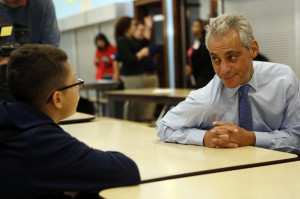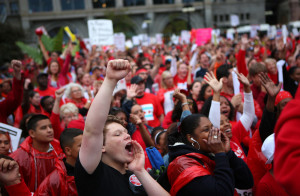Striking: Padding a Salary or Righting a Wrong?

When the Chicago teachers’ strike came to a close, 25,000 teachers returned to teach 350,000 students after eight days off of school. The ramifications of the strike went beyond simply a reduced number of instructional days for students. Working parents had to scramble to arrange a place for their children to go during school hours. 82% of children in Chicago Public Schools are on free or reduced lunch, which means low income parents had to foot the bill for food for their children’s meals while the teachers were on strike. The occurrence of the strike undoubtedly left hundreds of thousands of families in desperate situations, scrambling to find stopgap solutions for an uncertain amount of time. Parents and leading pundits characterized both the teachers and the strike as selfish and out of touch. However, despite the far-reaching, albeit unintended, consequences of this particular strike, strikes in general have been a vital part of American history for centuries, and they continue to constitute a crucial check and balance between employer and employee.
The first strike in U.S. history occurred in 1619 in the colony of Jamestown. Polish craftsmen that John Smith had recruited to make glassware and other goods were denied the right to vote in the colonial elections out of ethnic discrimination. The Poles went on strike and eventually, because of the economic benefits they brought to the colony, were granted the right to vote. The Poles, having been denied the right to vote, leveraged their important economic position in the community into a basic civil right. Unfortunately, not every strike situation is this straightforward.

The Chicago strike was generally seen as an effort by teachers to increase both their pay and their job security; in tough economic times, when the entire country is sacrificing, this seemed a bit hard to swallow. In this case, and comparable cases, it seems that the strike was used to by workers to exploit their employers for extra benefits. Oftentimes, an employer simply cannot afford to have his workers not work for an extended period of time, and the organization of the strikers creates allows workers to coerce their employer into conceding to their demands. The negative reputation of strikes for being tough on employers and a boon for lazy employees was reinforced with the Professional Air Traffic Controllers Organization strike in 1981. PATCO struck for, among other things, a 32 hour work week. During the two-day standoff, President Ronald Reagan called the strikers “a peril to national safety,” adding to the image of strikers as self-absorbed to the point of endangering others.
Strikes have arguably been misused, and it will always have its detractors, but, in the larger scheme of labor relations, strikes are integral to the employer/employee balance of power; they serve as a check and balance akin to those of the legislative, judicial and executive branches of government. If Congress passes a law, the President can veto it, or the courts can overturn it. If the President appoints someone unfit as a Supreme Court justice, Congress can refuse to confirm them. If an employer slashes an employee’s pay and increases their hours, the employee can strike. A strike is the most effective tool in the laborer’s small arsenal against his employer. Without a strike, a worker has almost no response to underpayment or overwork. If a large supply of labor outweighs demand (as is the case now), employers can enact measures that disenfranchise their employees. Without the option of a strike, these employees are forced to accept unfair treatment and cling to these jobs in order to feed their families. A strike maintains balance; if a group of workers decides to strike, the employer needs to decide which is greater: the value of what he would be giving up to appease the strikers, or the value of the employees to the company.
A strike, just like any tool, can be used for good or for evil. A group of employees with a sense of entitlement can use it to increase their benefits, or a team of hard workers can use it to acquire reward that is commensurate to their work. Strikes are not glamorous. Oftentimes, both parties end up getting hurt more than they would like. But a country without strikes would be like a government without checks: unbalanced, unfair, and unjust.